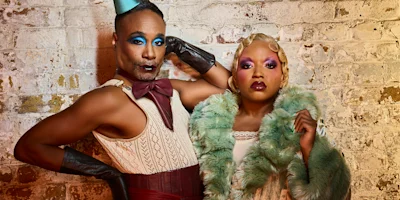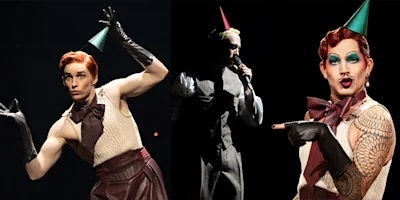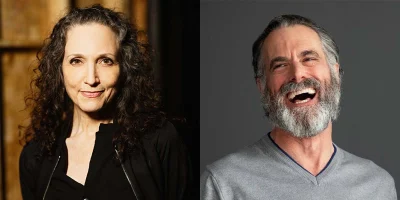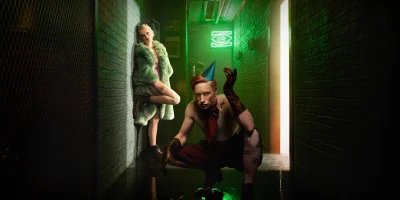
Billy Porter and Marisha Wallace lead a 'Cabaret' for a new generation
The longtime friends are the first Black actors to play the Emcee and Sally Bowles in the classic musical on Broadway, reprising their performances from London.
Come to the cabaret, old chum, where Billy Porter and Marisha Wallace are making history in the celebrated Kander and Ebb musical. In director Rebecca Frecknall’s award-winning Cabaret revival, they are the first Black performers to play the Emcee and Sally Bowles on Broadway.
They also happen to be “old chums.” Porter and Wallace initially played their respective roles in London earlier this year, and it was the first time they had worked together since becoming friends a decade ago. Between 2015 and 2017, Porter was in Kinky Boots and Wallace in Something Rotten! on Broadway a block apart.
Porter has only appeared on Broadway once since (he's otherwise been busy with producing, directing, Off-Broadway acting, and an Emmy-winning performance on FX's Pose), and Wallace not at all (she's been busy building a two-time Olivier Award-nominated London stage career) — until now, as the pair reprise their Cabaret performances through October 19 in Frecknall's New York production.
"It's been so nice to do this with a friend," said Wallace, then amended: "With a brother."
Cabaret unfolds within a 20th-century underground nightclub in Berlin that slowly succumbs to Nazism. That Frecknall's production is semi-immersive only adds to the intensity for both the audience and the performers — it's the kind of gig that requires a strong support system. Ditto for taking on two of the most iconic all-time theatre roles in two of the world's biggest theatre hubs.
Porter and Wallace clearly are that support system: A mutual respect and easy rapport was evident as they seamlessly bounced off each other. Porter gave a high compliment about Wallace's performance: "Not since Liza, honey" — as in Liza Minnelli, whose Oscar-winning turn as Sally Bowles in director/choreographer Bob Fosse's landmark 1972 Cabaret film is a definitive one. And Wallace described her experience with Cabaret as "two generations coming together, because I learn from Billy."
"You'll see, even in the show, the connection we have is strong because of the connection we have outside the show," she said. "It's a dream."
New York Theatre Guide spoke more with the pair about their longtime friendship, Cabaret's lasting resonance with audiences all over the world, and what they've learned from each other on and off stage.

Having been friends for years, did you seek out Cabaret together, or were you coincidentally paired up in London?
Marisha Wallace: We've kept in touch for years; we left Broadway around the same time as well. I moved to London, and when Billy would come into town, we would still hang out. And then I got this role in London, and they were like, "You need an Emcee to match you." And I was like, "I think I know the best person for that." So I called him.
Billy Porter: She's like my little sister, and I'm like her big brother.
How will doing this show in America be different, both in terms of the audience and for you personally?
Porter: I'm interested because both of our characters are from the States. Our backstories are, we fled the Jim Crow South to go to Europe, thinking we would be free, only to be then carted off with the Jewish people to our deaths.
I'm really curious to feel [the audience's] response to our Americanisms. I go in and out: German accent, English accent, French accent, American Black accent — code-switching.
Wallace: Notoriously, the British audience is supposed to be quieter than American audiences, but I will say the British audience was going wild. They were going wild!
They were screaming. We had standing ovations mid-show. And these were the British folks! So the American ones, I think they're going to turn out.
Porter: So get ready.

Is there any moment in the show that elicited a strong audience response that surprised you?
Wallace: I knew people would go crazy for [the song] "Cabaret," but I didn't know people would [have] a visceral response to the end of it, the stomping on the floor and standing. People were crying. It was a release of all the pent-up frustrations we have. It's a nice place to just let that out and to feel it, 'cause sometimes you're just going about your daily life, you just have to get through. But in this show, you get to feel all the emotions: the joy, the sadness, the heartbreak.
What do you each bring to the Emcee and Sally Bowles?
Porter: It's simple. It's ourselves. We bring our authentic selves to these roles. And simply, as African Americans, that's all we need to do.
Wallace: What Billy brings is — it's nothing like having someone who is a veteran in this thing we do. 'Cause you have been around so long, and you have been entrenched in Broadway, in musicals, in theatre, in television, film. It's like watching an icon. It's amazing to watch you do your work, because it's old-school in that way, like I'm about to go see James Brown. I'm about to go see Aretha Franklin. I'm about to go see somebody who is a legend in their craft. That's what's so exciting when he comes out of the floor.

Can you describe the experience of seeing this Cabaret revival for the first time before you joined?
Wallace: I saw it first with Eddie Redmayne and Jessie Buckley in London. I was like, "Oh, wow, we're doing something very different with this, the aesthetic. I love this immersive element of it." There's not been many productions of Cabaret, big productions, in a while, so there's [...] a whole generation of people who have never seen this show. So it was so exciting to see all those generations enjoying the show together.
And the fact that we still need this show all these years later is crazy.
Porter: It's kind of sad.
Wallace: Every production is like, "It's for now. It's for now. It's for now." It was so cool seeing how it translated to who we are now.
Even how women are portrayed in this musical — this is the first time I saw a woman's rage in a musical to this level, where they were cracked open. We're so used to women in musical theatre being prim, proper, or if they do have some kind of conflict, you don't really see all the underbelly.
Porter: I'm an old head. I'm on the younger side of the older generation. And the connection to Fosse and his shows — you can't extract the Fosse DNA from his shows because Fosse is so singular, right? This was the first version I've watched where the vision creatively pulled away from the original yet held on to that quality of singularity that makes it special.
I was very moved, particularly with Julia Cheng's choreography, because it felt like the torch had now been passed to a new generation of not just performing artists, but the creative artist side as well.
Wallace: And Tom Scutt's design, Rebecca Frecknall's direction — they saw the blueprint but then made it their own, which I thought was amazing.
Porter: This is Cabaret for a new generation.

What do you want audiences to remember about this production once it closes?
Wallace: I want people to to think about, what would you do? What would you do if you were living in a time where a fascist is coming into power and things are changing around you? What are you going to do? Fight, run, hide? That's what we have to find out. That's the question Cabaret asks.
Porter: It's literally a song.
Wallace: How are you going to fight the craziness going on around you and still also find some act of joy? I always say Black joy is my activism. Me being joyous and still finding things to love and still presenting art and still showing up, even in a dark time, that's also activism.
Porter: I want it to be a call to action. I want it to be a fire lighting under people's booties. I want it to remind us, remind the people, that actually, we do have the power, and we have to do it together.
What have you learned from each other during this process?
Porter: I've learned to remember my joy. I have a hard time with that.
Wallace: I told him when he came to London, you can do your art without resistance. You can just relax. It's okay.
Porter: She's so joyful, and I have that rub off on me.
Wallace: What I learned from Billy: his resilience. I read his memoir while we were doing Cabaret, and I knew him, but to know where he's come from and the things he's been through, to still be standing here with your head high and still being unapologetically yourself — oh, I'm crying! I'm weepy! — that's keeping me going.
There were moments during the run where I was like, "What's gonna happen? I'm going to Broadway!" He was like, "Everything in due time. Everything will work out the way it's supposed to." And here we are, standing above the city, and our joy and your resilience really inspires me. It really does.
This interview has been condensed and edited for length and clarity.
Top image credit: Billy Porter and Marisha Wallace. (Photo by Jay Brooks)
In-article image credit: Billy Porter and Marisha Wallace in Cabaret on Broadway. (Photos by Marc Brenner)
Frequently asked questions
What is CABARET at the Kit Kat Club about?
Wilkommen to the August Wilson Theatre, transformed into the Kit Kat Club for the latest revival of Kander and Ebb's classic musical. Come to the cabaret for the story of writer Cliff, performer Sally, the mysterious Emcee, and how their relationships and more clash with the rise of fascism in Germany.
Where is CABARET at the Kit Kat Club playing?
CABARET at the Kit Kat Club is playing at August Wilson Theatre. The theatre is located at 245 West 52nd Street, New York, 10019.
How long is CABARET at the Kit Kat Club?
The running time of CABARET at the Kit Kat Club is 2hr 45min. Incl. 15min intermission.
What's the age requirement for CABARET at the Kit Kat Club?
The recommended age for CABARET at the Kit Kat Club is Ages 13+..
How do you book tickets for CABARET at the Kit Kat Club?
Book tickets for CABARET at the Kit Kat Club on New York Theatre Guide.
Who wrote Cabaret?
Joe Masteroff (book), John Kander (music), and Fred Ebb (lyrics) wrote the Cabaret musical. The show is based on I Am a Camera, a play by John Van Druten, which is in turn based on the book Goodbye to Berlin by Charles Isherwood.
Who directed Cabaret?
Rebecca Frecknall directs Cabaret on Broadway after premiering her production in London, where it won seven Olivier Awards, including Best Musical Revival. The New York transfer marks her Broadway debut.
What are the songs in Cabaret?
Cabaret has a score by John Kander and Fred Ebb, featuring iconic showtunes like "Cabaret," "Mein Herr," "Wilkommen," and "Maybe This Time."
Is Cabaret appropriate for kids?
Cabaret is recommended for audiences 12 and older. The musical contains depictions of Nazism as well as suggestive content. Please note that children 4 and younger are not permitted in Broadway theatres.
Is Cabaret good?
Cabaret is one of the most beloved musicals of all time, and director Rebecca Frecknall's semi-immersive production received rave reviews and multiple awards. Audiences will be fully enveloped in the world of the Kit Kat Club as never before while still experiencing the time-honored songs and story.
Originally published on















